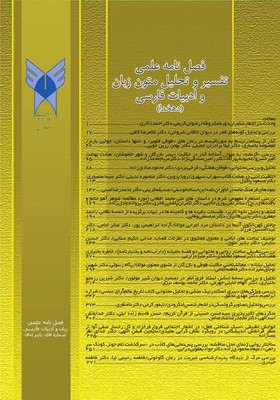وحدت، در اشعار شاعران دورۀ مشروطه
محورهای موضوعی : متون زبان و ادبیات فارسی
1 - دانشجوی دکتری گروه زبان و ادبیات فارسی، واحد کرج، دانشگاه آزاد اسلامی، کرج، ایران.
2 - دانشیار گروه زبان و ادبیات فارسی، واحد کرج، دانشگاه آزاد اسلامی، کرج، ایران.
کلید واژه: ترانه, تصنیف, مشروطه, ادبیات سیاسی, سیاست,
چکیده مقاله :
همانطور که میدانیم ادبیات شفاهی هر ملت، بهترین بیان کنندۀ باورها و ذهنیات یک ملت و سیاستهای حاکم بر ایشان است و تاریخ هر ملتی را، میتوان با تأمل در فرهنگ آن ملت، از جمله ترانههایشان جستجو کرد. ترانهها و تصنیفهایی که گاه برای تغییر یک حکومت یا یک سیاست، ملتی را متحد کردهاند و یا طبق شرایط سیاسی خاص، متولد شدهاند، مانند اشعار و ترانههای دورۀ مشروطیت که در این دوره وحدت موضوعی و مضمونی، به چشم میخورد و مضامینی چون دعوت به مبارزه، ترسیم چهرۀ بیدادگری و کجفهمی پادشاهان، بیان جنایات مستبدان داخلی و خارجی و شرح خیانتهای آنان به مملکت ایران، ستایش آزادی و شهدای آن و القای امید به آینده، دعوت به مبارزه با یاری گرفتن از عناصری چون ارتقای سطح آگاهی مردم و بزرگداشت شهدای راه آزادی. از این رو جلوههای گوناگون ادب پایداری آیینی، ملی و انسانی شکل گرفت. برای شکوفایی این مؤلفهها، عصر مشروطه سهم بسیاری دارد، به دلیل آنکه آغازگر تحولات نوینی در عرصۀ سیاسی و اجتماعی و به تبع آن تغییراتی در حوزۀ فرهنگ و ادبیات کشور همچون دموکراسی بود. در این جستار، سعی بر این است که با بررسی اشعار دورۀ مشروطه، هماهنگی شاعران و همچنین وحدت موضوعی و مضمونی اشعار را، بررسی نماییم. این تحقیق به روش توصیفی- تحلیلی(کتابخانهای) انجام گرفته است
As we know, the oral literature of each nation is the best expressive of the beliefs and minds of a nation and its ruling policies, and the history of any nation can be sought through reflection on the culture of that nation, including their songs. The songs and ballads that sometimes have been united by a state or a policy, or in accordance with certain political conditions, are born, such as the poems and songs of the mashrote period, which are in this period of thematic and thematic unity, and themes such as invitations to The struggle, the depiction of the curiosity of the kings, the expression of the crimes of the domestic and foreign tyrants and their treason to the Iranian nation, the praise of freedom and its martyrs, and the induction of hope for the future, the invitation to fight by helping with elements such as raising the level of people's awareness and commemorating the martyrs Way of freedom Hence, various manifestations of ritualistic, national and humanistic literacy were formed. In order to flourish these components, the mashrote age has contributed a lot, because it initiated new developments in the political and social arena, and consequently, changes in the field of culture and literature of the country such as democracy. In this essay, we try to investigate the poems of the mashrote era, the coordination of the poets as well as the thematic unity of the poems. This research has been done by descriptive-analytical (library) method.
کتابها
آرین پور، یحیى (1387) از صبا تا نیما، جلد 2، تهران: نشر زوار.
بهار، محمدتقی(1390) دیوان، چاپ بر اساس نسخۀ 1344، تهران: نشر نگاه.
خالقى، روحالله (1353) سرگذشت موسیقى ایران، جلد 1، تهران: نشر صفیعلى شاه.
شمیسا، سیروس (1386) سیر رباعی در شعر فارسی، تهران: نشر علم.
شمیم، علیاصغر (1343) فرهنگ امیرکبیر، تهران: نشر امیرکبیر.
عشقی، سید محمدرضا (1357) دیوان، به اهتمام علی اکبر مشیر سلیمی، تهران: چاپخانۀ سپهر.
فرخی یزدی (1363) دیوان فرخى یزدى، به کوشش حسین مکى، تهران: نشر امیرکبیر.
فردوسی، ابوالقاسم (1388) شاهنامه، تهران: نشر قطره.
کریستین سن، آرتور (1363) شعر و موسیقی در ایران قدیم، ترجمۀ عباس اقبال، تهران: نشر هنر و فرهنگ.
گلبن، محمد (1351) بهار و ادب پارسی، مجموعۀ مقالات بهار، تهران: شرکت سهامى کتاب هاى جیبى.
مقالات
همایی، جلالالدین. (1339). غزل و تحوّلات اصطلاحى آن در قدیم و جدید. یغما، 13(142)، 77-86.
_||_Books
Ariyanpour, Yahya (2008) From Saba to Nima, Volume 2, Tehran: Zavar Publishing.
Bahar, Mohammad Taqi (2011) Diwan, printed based on the 1344 edition, Tehran: Negah Publishing House.
Christian Sen, Arthur (1984) Poetry and Music in Ancient Iran, translated by Abbas Iqbal, Tehran: Art and Culture Publishing.
Eshghi, Seyyed Mohammad Reza (1978) Diwan, by Ali Akbar Moshir Salimi, Tehran: Sepehr Printing House.
Farrokhi Yazdi (1984) Diwan Farrokhi Yazdi, with the efforts of Hossein Makki, Tehran: Amirkabir Publishing House.
Ferdowsi, Abulqasem (2009) Shahnameh, Tehran: Qatre publishing house.
Golban, Mohammad (1972) Bahar and Persian literature, collection of Bahar essays, Tehran: Pocket Books Company.
Khaleghi, Ruhollah (1974) History of Iranian Music, Volume 1, Tehran: Safiali Shah Publishing.
Shamim, Ali Asghar (1964) Farhang Amirkabir, Tehran: Amirkabir Publishing.
Shamisa, Siros (2007) Siir Rabai in Persian Poetry, Tehran: Alam Publishing.
Articles
Homayi, Jalaluddin. (1960). Ghazal and its idiom changes in old and new times. Yaghma, 13(142), 77-86.


